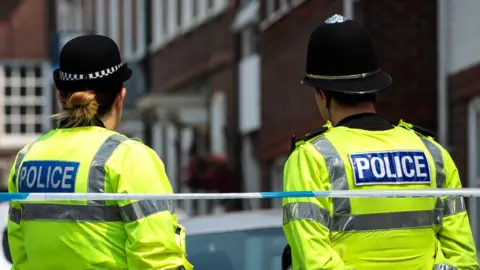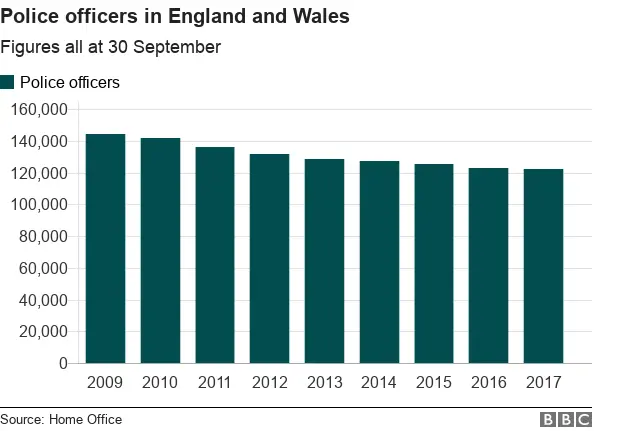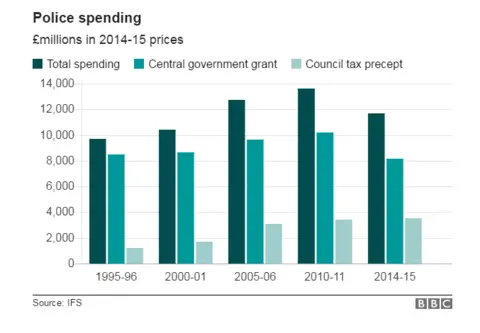Police funding: Government pledges extra £300m
 Getty Images
Getty ImagesPolice forces in England and Wales are set to receive an extra £300m to help pay for pension expenses and other costs, ministers have announced.
Since 2010, central government funding to police forces has been cut by almost a third, in real terms, leading the number of officers to fall by 21,000.
Police and Crime Commissioners, who represent the public, say the stretched service is struggling to cope.
Police Minister Nick Hurd accepted the deal came at a "time of real pressure".
He added that forces needed "additional support to help them do their job" and said officers were "bearing down on the worst spike in serious violence and knife crime that we have seen in a decade".
The funding breaks down as:
- An extra £161m next year for England and Wales' 43 police forces, which the Home Office says will protect police budgets in "real terms". This brings the total to £7.8bn next year
- A £153m grant to help plug a shortfall in funding because of changes to pensions contributions
Police and Crime Commissioners will also be able to increase the policing element of council tax.
This means households could pay an extra £24 a year for a Band D property, although local residents must be consulted first.
Home Secretary Sajid Javid said the various funding announcements, as well as money for serious and organised crime units and counter-terrorism, could mean a total increase in funding for the police system of "up to £970m" - the biggest since 2010.

Analysis: 'A measure of financial stability'
Ministers have listened. The settlement won't be anywhere near enough to reverse the 30% real-terms cut in central government funding to forces since 2010, but it provides them with a measure of financial stability and will enable some constabularies to go ahead with plans to recruit extra officers.
Crucially, it'll largely plug a £165m pensions gap in 2019-20 which PCCs hadn't budgeted for.
However, the overall police workforce remains shrunken: there are 44,000 fewer officers, staff and community support officers than in 2010: demand on the service is rising; and serious violence is at levels not seen for a decade.
The next spending review, which is expected to cover a five-year period from 2020, will be crucial in determining whether those issues are addressed.


Roger Hirst, of the Association of Police and Crime Commissioners, welcomed the extra funding, saying it would help them to deal with cost pressures from inflation and pensions, and invest in technology.
He said the ability to raise council tax levels would allow for investment in local policing priorities, an area the public wants more investment in.
But David Jamieson, Labour PCC for the West Midlands - the second largest force in England and Wales - said the payments fell a "long way short".
He said West Midlands Police has faced cuts of £175m since 2010, leading to a fall in officer numbers by more than 2,000.
"Despite warm words over the last few months, this is once again a disappointing settlement that falls a long way short of what West Midlands Police needed from the government.
"Government grants to West Midlands Police are falling in real terms and the government is piling the pressure on council taxpayers.
"Crime is rising and we require a significant boost in police officer numbers to tackle the problem.
"At a time when living standards are being squeezed and our economic future is increasingly uncertain, the government has made it clear it expects PCCs to increase council tax."

The National Police Chiefs' Council - which represents the country's most senior officers - said the government had been right to recognise the serious pressures on policing.
The Police Federation, which represents police constables, sergeants and inspectors, accused the government of "passing the buck" of funding to local communities.
Labour's shadow policing minister Louise Haigh said the settlement represented a ninth consecutive year of real-terms cuts to the police by central government.
She said plans to raise income from council tax payers were "perverse" and accused Mr Hurd of trying to dress up "cuts from central government funding" as good news.
